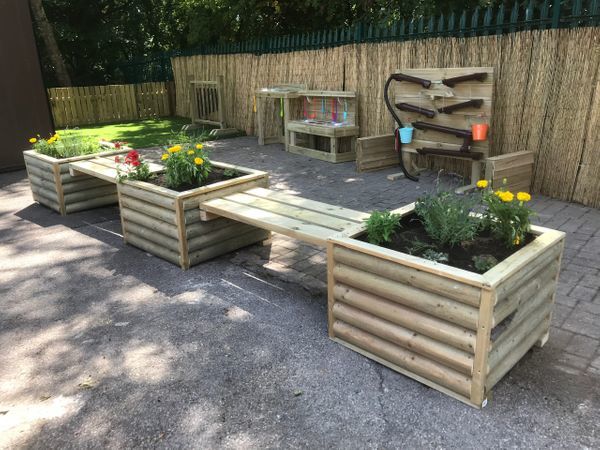Top 10 benefits of gardening for children

Very few things are better than grabbing your watering can and trowel, heading out into the sunshine, and getting your hands dirty with some gardening. But while most adults garden to relax or beautify their homes, this hobby can have a huge positive impact on the growth, fulfilment and wellbeing of children.
Read on to discover the top 10 benefits of gardening for children, and how you get them involved at your school, nursery or daycare.
1) Improves development of motor and cognitive skills
On the surface, gardening is simply the practice of growing and cultivating plants. But achieving this goal actually involves an incredible range of physical and mental tasks.
Digging, carrying and clipping all build physical strength and hand-eye coordination. Similarly, learning about various plants and techniques, engaging imaginative freedom in garden arrangements, and asking thoughtful questions to improve outcomes all promote intelligence.
Actively engaging these processes helps children master the basic skills they’ll use consistently throughout the rest of their lives. These gross motor skills and cognitive exercises also translate to better academic skills such as writing, typing and critical thinking. As a result, children are more likely to achieve highly in school and go on to succeed consistently in later life.
2) Engages all five senses
From the moment we’re born, we use our senses to learn about and interact with the world around us. The more we use these senses, and the more we experience with them, the sharper they become.
Where other beneficial activities like reading or sports engage two or three senses at once, gardening is special in that it uses all five:
- Sight: many sizes, colours, shapes and characteristics of hundreds of plants, animals and insects.
- Hearing: constant outdoor ambiance, such as the wind, rustling leaves and trees, birdsong, animal calls, traffic and the sound of labour.
- Touch: textures of different plants, as well as the feeling of soil, tools or cold water.
- Smell: the scent of plants and flowers.
- Taste: eating any vegetables that are grown in the garden.
By engaging all five senses, often at the same time, gardening helps children develop their sensory awareness. This type of sensory play is valuable for all children, though it’s of particular benefit to children with special educational needs.
3) Positively influences mood and psychological wellbeing
Children and young people are currently experiencing an epidemic of stress, depression, anxiety and poor mental health. This makes it vital to teach children effective techniques for managing their emotional and psychological wellbeing.
Gardening is a powerful therapeutic tool that has both immediate and long-term effects on a child’s disposition. Fresh air and open spaces create a sense of peace. Creative play offers an emotional outlet. Physical exercise is good for stress. And successfully growing plants or developing a garden creates a sense of achievement and self-esteem.
Involving children in gardening from a young age allows them to develop a positive sense of self, and to develop strategies for managing their feelings. And when you enjoy this hobby with them, it also deepens your relationship and encourages them to be open about their thoughts and feelings.
4) Builds a healthy immune system
Children who enjoy outdoor play are shown to have stronger immune systems than children who spend the majority of their free time inside. Exposure to minor amounts of dirt and garden bacteria helps their bodies recognise and learn how to deal with potential threats early on. This in turn helps them to lead happier, healthier lives.
Similarly, gardening tends to leave us with dirty clothes and hands, which we then need to wash. This teaches children the value of cleanliness, leading to positive hygiene habits.
5) Encourages healthy eating
Many parents have their own horror stories about fussy children at dinnertime. Although they know vegetables are good for you, it’s hard to help a child understand.
But when children grow their own vegetables, they recognise them as an extension of an activity they enjoy. As a result, they’re much more likely to eat their vegetables without complaint. This leads to a healthier diet at a young age and encourages better lifestyle choices that protect against obesity and other health problems in later life.
Having participated in growing – and possibly even cooking – their own food, children who garden also recognise the hard work involved. As such, they develop an appreciation for quality food, and learn to maintain a varied and nutritious diet.
6) Promotes good planning and organisation
When you visit the supermarket, you’ll find fruits and vegetables of all seasons lining the shelves year round. But while this might be possible with industrial greenhouses, the same can’t be said for your garden.
Since certain plants will only grow at certain times of year – and even then only in certain conditions – a successful garden requires careful planning. At the same time, it’s important to consider what plants grow well next to one another, or what environmental factors might prevent successful growth.
Inviting children to explore the possibilities of gardening gives them the opportunity to practice their planning and organisational skills. It teaches them to think critically about their decisions, and to experiment with different arrangements.
However, not all approaches will be successful. This is a great time to teach children about the value of trial and error. By welcoming new ideas and treating failure as a learning experience, you also promote a sense of flexibility for adapting to and managing unexpected setbacks.
7) Teaches respect for the environment
Gardening directly exposes children to the life cycle of plants and insects. Exploring these relationships within the natural world gives them a deeper understanding of the effect they and those around them have on the environment. Their attachments to the plants they grow also encourages a healthy respect for nature.
As such, gardening teaches children the value of good environmental practices, such as limiting use of disposable plastics and recycling whenever possible. These habits allow them to combat climate change, or develop an understanding that prepares them to engage with the discussion in political decision making.
8) Teaches patience and responsibility
In a world of social media, fast food and 30-second videos, children are constantly exposed to instant gratification. This can lower their attention spans, and lead to shortness of temper.
But gardening is a slow process that requires regular attention and effort to achieve good results. Children become responsible for the outcomes of the efforts and actions, as well as caring for their gardening tools and equipment. They also learn that satisfaction can take time, and that this remains true even when progress isn’t yet visible.
Developing a respect for patience and responsibility helps develop a child’s resilience. Their ability to handle delayed gratification allows them to remain calm, think clearly and establish long-term plans for success.
9) Provides hands-on education
Perhaps surprisingly, gardening involves a range of topics that appear in the national curriculum. For younger children, gardening teaches them about the weather, seasons, colours, shapes, measuring, counting and even reading. For older children, plants and animals appear in biology, complex weather cycles are part of geography, and more knowledge of advanced tools and systems is useful for engineering.
This intimate understanding of national curriculum topics, as well as their context, is pushed further by the ability to articulate themselves. When discussing gardening, particularly with people who don’t participate, a child needs to know how to express the knowledge, thoughts and opinions. This makes it easier to thoroughly answer longer exam questions.
10) Develops social skills
Oftentimes, gardening is a social activity. Children learn gardening by working together with their parents, or with their peers in a school gardening club.
That means children get used to working together to reach their goals, and discussing the flowers and processes involved. The anticipation and excitement they feel in seeing their efforts pay off also becomes a shared experience.
Similarly, picking up a beloved hobby from a young age creates grounds for peer bonding throughout children’s entire lives. It becomes much easier to connect with others who enjoy gardening, but also offers an interesting topic of conversation for those who’ve never experienced it. This helps children build and maintain their own friendship networks, which can support them as they grow.
Get stuck in with high-quality gardening and outdoor educational play equipment
Giving children at your school, nursery or daycare centre the opportunity to enjoy the benefits of gardening starts with finding the right equipment. At Landscapes 4 Learning, we provide a wide range of outdoor educational play equipment to help you provide the best gardening experience possible. This includes toolsets, planters, bug hotels, bamboo pots and more for the ultimate kids’ garden.
Visit our online store to find a wide range of equipment to start your gardening adventure, and help your children develop valuable habits and skills.
